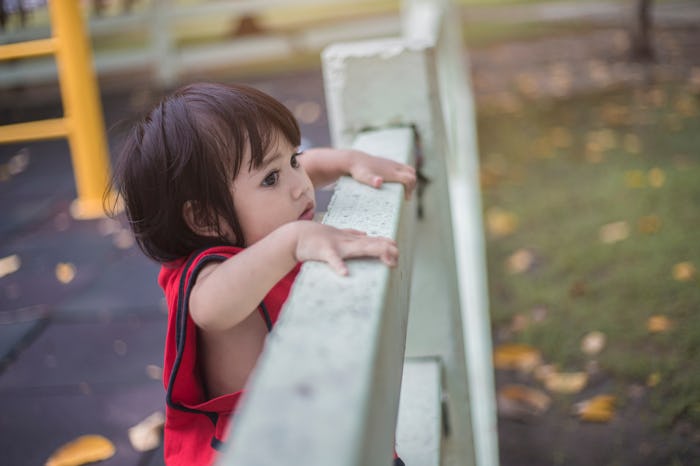Life

Here's What A Psychologist Has To Say About Your Child's Summer Friendships
If your child was previously in preschool, and is now enjoying the "freedom" of summer, you might just notice an uptick in the number of times they beg for a playdate. Or maybe you're realizing your kid is talking a lot about particular school friends, or just seem sad or lonely. While an obvious solution would be to call up one of their school buddies, should preschoolers stay in touch with friends over the summer? Especially because, in most situations, it's not guaranteed that they'll be classmates when school starts up again.
Romper spoke to Dr. Melanie Fernandez, Ph.D., a clinical child psychologist practicing in New York City, to better understand how social your child should be during the summer months.
"There is empirical evidence that supporting preschoolers in keeping touch with their friends over the summer is valuable," Dr. Fernandez says. "Friendships typically begin to emerge during the preschool stage of development, and even at this young age, friendships can be stable and lasting."
According to a 2018 study published Psychological Science, boys who spent more time with their friends had lower blood pressure and a lower body mass index (BMI) when they entered into their 30s. (It should be noted that BMI is now considered to be a controversial way to measure a person's health.) And a 2011 study published in Early Childhood Research & Practice found that friendships among preschoolers can help children develop important and long-lasting emotional and social skills.
Keeping up friendships over the summer leads to more opportunities to practice social skills that help kids thrive in school and life beyond school, too, Dr. Fernandez says. It can also boost them academically and even support their physical health. "In fact, research has suggested that kids’ social competence in kindergarten helps predict outcomes such as educational attainment, employment, and substance abuse, up to two decades later, even when controlling for variables such as socioeconomic status," she says.
It is also common for preschool friendships to be disrupted, such as when children go to different schools. Parents need not feel guilty or worried if they are unable to keep in touch.
As a parent of a rising kindergartener this summer, Dr. Fernandez knows that it can be challenging to find ways to schedule playdates with preschool friends over the summer. "As to how parents can support keeping in touch, prioritize it in your child’s schedule like you would other activities such as music or swim class," she tells me. "I have made a commitment to keep my daughter in touch with several preschool friends as she heads to Kindergarten in the fall at a different school than many of her former classmates. In fact, we have a standing play date weekly with a buddy and former classmate (whose mother also happens to be a child psychologist) who will attend a different elementary school than my daughter in the fall."
So obviously your child is doomed forever if you haven't already made arrangements for playdates, or if they're going to a different school than their preschool friends, right? Not so.
"It is also common for preschool friendships to be disrupted, such as when children go to different schools. Parents need not feel guilty or worried if they are unable to keep in touch. The good news is that children are resilient and adapt and develop new friendships," Dr. Fernandez explains. There are things you can do to support your children in developing social skills, even if they don't maintain connections with their preschool friends. These include finding other social engagement opportunities, modeling positive emotions yourself, practicing emotion coaching, and providing a supportive (rather than critical) presence during your child's social interactions.
Summer definitely doesn't last forever (even though, on some days, it might certainly feel that way!), but you can still plan to meet up with some preschool parents at your local library, playground, or pool. The social benefits are worth the time.
This article was originally published on